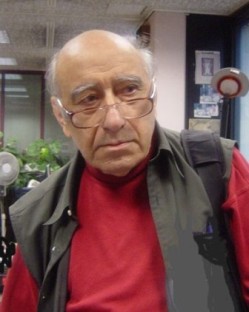Khalid Kishtainy was born in Baghdad in 1929. He trained as a lawyer and an artist. He graduated from University of Baghdad, Faculty of Law in 1953 and from the Institute of Fine Arts, Painting in 1952. He was teaching at the Fine Arts Institute in Baghdad when the 1958 Iraq Revolution shook the country. He left in 1959 to join BBC in London as an Arabic script writer and translator. Since 1964 he has worked as a freelance author, journalist and translator writing over a dozen works in Arabic and ten books in English, including the now classic text, Arab Political Humour (Quartet). Since 1989 he has written a daily satirical column in al-Sharq al-Awsat, which has been republished in three collections, earning him many admirers in the Arab world and beyond.
1952 art teacher
1953 Practice of law.
1953 art student in London
1957 Art teacher at the Academy of Fine Arts, Baghdad.
1959 Joined the BBC in London, Arabic script writer and translator
1964 Freelancer as author, journalist and translator
1975 Consultant to the Iraqi Cultural Centre, London.
1989 Columnist with 'al-Sharq al-Awsat' daily , London.
website at: www.kishtainiat.com
Books by Kishtainy in English:
Arabian Tales [Hardcover]
A man who goes to bring a handful of soil from his motherland; a boy who defies authorityto eat an orange with his mother; how dogs and cats caused chaos with the Arab/Israeliconflict; the consequences of a perfumed handkerchief discovered in the underpants of abusiness executive; the cost of old sins. Those who know already the wit and wisdom ofKhalid Kishtainy and who have read his syndicated newspaper columns for many years willbe delighted by this collection of short stories; some sad, some erotic, but all imbuedwith sympathy for the dilemmas of humanity. For readers unaware of Kishtainy'sinternational reputation for skewering the great and the good with his sly, capricioushumour, a delightful discovery awaits you.
Tomorrow Is Another Day
A Tale of Getting By in Baghdad by Khalid Kishtainy
a novel published in 2003 by Elliot and Thompson
‘No Das Kapital or twenty holy books will help you in this country of ours. You have simply wasted your time. If only you had learnt how to write poetry, you could compose some eulogies in praise of our leader and earn some good money. He may have given you a house, one of those confiscated from the Jews.’
Released from Baghdad’s notorious Abu Gharib prison to celebrate the Great Leader’s victory - though no one is quite sure which victory it was - Muhammad Zabib must find a job. Discovering that marriage to a war widow means a government grant and a Chevrolet, Muhammad marries four widows, as good muslims may, and starts a successful minicab business. But four wives bring more sorrow than joy and Muhammad must start to look elsewhere to maintain his good fortune. So begins this rollicking, picaresque tale of ordinary people attempting to make the best of their lives in the appallingly un-ordinary milieu of Saddam’s Iraq. Like Hasek’s Svejk or Voltaire’s Candide, Khalid Kishtainy has crafted the archetypal little man caught up in the horror and idiocy of war, but ever determined to battle through it. The satire may seem extreme; at one point our hero even invents a portable mosque. But the reader never loses sight of an essential humanity and compassion which informs this remarkably funny novel.
By the Rivers of Babylon( Novel)
Tales From Old Baghdad (Novel)
Checkpoint(Plays)
The Prostitute in Progressive Literature
Arab Political Humour
Theatre with Commitment
Verdict in Absentia
Palestine in Perspective
Whither Israel?
The New Statesman and the Middle East




